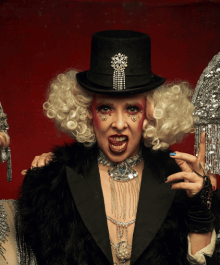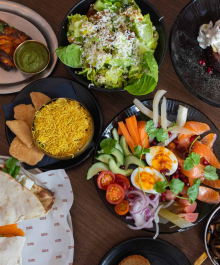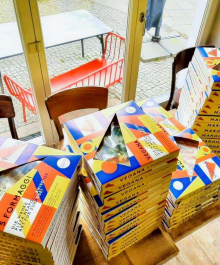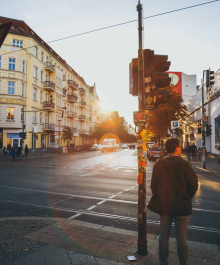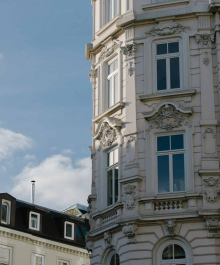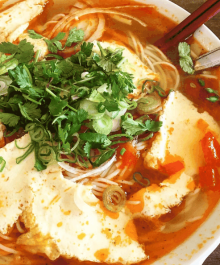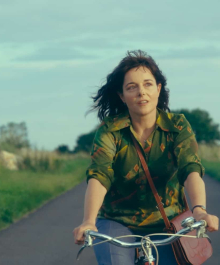
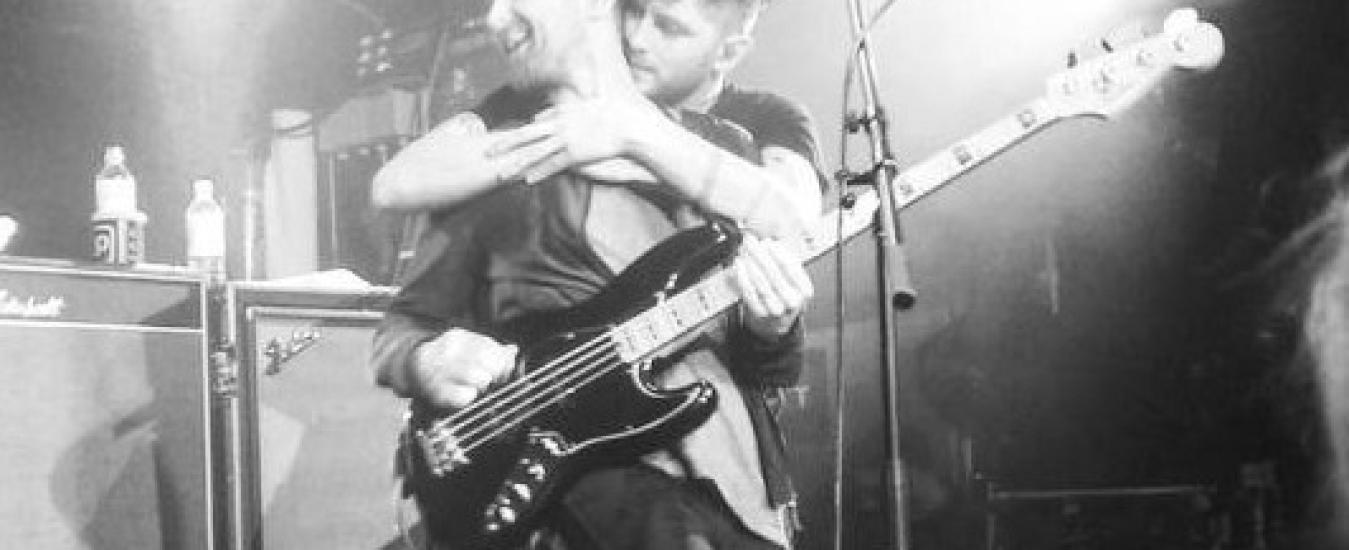
Before conducting this interview, I was lucky enough to be able to watch Twin Atlantic sound check. It was, I thought, a rare spectacle. Not only because I was privy to the nuts and bolts of live stage performance, but because Twin Atlantic displayed the same frenetic energy while adjusting levels and acoustics that they did when they took to the stage for the real thing a few hours later.
On the other hand, I shouldn’t have been surprised. Formed out of Glasgow in 2007, Twin Atlantic have built a steady following for precisely this reason: unrelenting passion. After an uncertain start with their 2009 EP “Vivarium”, Twin Atlantic was able to channel a more refined still jagged sound with their debut full-length album, “Free” in 2011. Their follow-up album generated “Heart and Soul”, a song tailored to be an arena-filler, which did exactly what it promised, and brought the band to mainstream audiences. But with their newest album, “GLA”, they’re pushing past that, combining old influences with new to deliver a confluence of genres which is familiar but concurrently raw, untamed and distorted.
Guitarist Barry McKenna and drummer Craig Kneale sat down to answer a few questions ahead of their show in Berlin at Musik & Frieden on July 20th.
1. So, were you guys in any bands before Twin Atlantic?
C: Barry was in a touring band from Glasgow that did pretty well. The rest of us were kind of in local bands all playing at the same venues at each other. We were all about 20 when we started touring together. I mean we were all in different bands, but this one was the one where we kind of took it the most seriously. It’s quite hard to find a group of people who are all passionate about it, so we were pretty lucky.
2. Were those previous bands of similar genre and did they have any influence or impact on Twin Atlantic’s current sound?
B: I think it had an impact in terms of: our previous bands were all our first foot into the door of music. It’s kind of like anything, you learn as you go, and there were definitely lessons we learned in our original bands that tied into this band. Over time you streamline things, you get better and you make little improvements as you go. All of our original bands were, they were almost like apprenticeships, I guess.
BLY: A way to cut your teeth?
C+B: Kind of! Yeah, kind of.
B: Ultimately it was those bands that brought us all together, so it definitely affected us in that way.
3. “Free” and “Vivarium” were albums that brought Twin Atlantic to prominence, and were both quite heavy. Would you say “The Great Divide” was written for a more mainstream audience?
C: I think so. I think our song writing was just going that way. I don’t know if it was necessarily the music we loved to personally listen to. We reached a point with Sam where it just seemed to be heading that way and he was getting better at writing songs.
BLY: Just kind of how the music evolved?
B: A lot of it was informed by the gigs we were playing, and the exposure that we had. Because off the back of “Free”, it was the first time that we got played on the radio. And because of that, promoters and other bands started to take us seriously, and gave us really big support slots. We started playing with other bands in really big arenas, you know, outdoor arenas. I think once we found ourselves in front of those types of audiences, it was natural to then try and create music which fit in that size of arena. We were trying to make songs that would make sense in that format.
BLY: So making music that would appeal to a bigger audience?
C: I think so, yeah. It was weird; it was never like intentional but it just naturally occurred this way. But this new album is kind of going against that.
4. So your newest single “Ex El” dropped a few days ago, on your new album, “GLA”. These songs are heavier than “The Great Divide”. Based on that can we expect the music to hark back to Twin Atlantic’s earlier pieces?
C: Not even really back to the old stuff, it’s kind of a new thing – for us anyway – it’s pretty gritty. It’s heavier but it’s more about the atmosphere of the music. After “Great Divide” we realised we were writing music that we didn’t all necessarily totally love. Nothing against the songs themselves, but we thought we should probably make music that we all personally want to listen to. It wasn’t a battle against the last album; it felt like something totally different.
B: I think we embraced a lot of the things we had previously shied away from. Because before we were so focused on the song craft, and trying to write these perfect pop/rock songs. There was no room for meandering or weirdness or extra atmospherics. Whereas on this one, instead of looking for those moments, we were just letting them happen. It was more about allowing ourselves to run with those sonics and those influences rather than excluding some weirdness in what would be a perfect three-and-a-half minute song. It was kind of like: the shackles are off, let’s just embrace it and have some fun.
5. I imagine there must have been pressure to lose the Scottish accent in the field of more mainstream music. Is this something TA deliberately held on to? And does it contribute to a large part of TA’s identity as a band?
B: Sam always says the music should be sincere and heartfelt, and quite heart-on-your-sleeve. He’s always maintained that if he’s truly going to believe something, and other people are going to buy into it as well – whatever it is he’s singing about – he’s always maintained it would be weirder to do it in somebody else’s voice, to fake it. People are smart enough to see through bullshit and if you’re ultimately portraying this fake persona, then that wouldn’t be keeping within the honest side of music.
6. I was looking forward to seeing Twin Atlantic play at Open’er Festival in Poland, but I’d heard that Sam had suffered from a viral throat infection and you were forced to cancel a few shows in Europe. How do you guys deal with these kind of setbacks as a band?
B: It’s just really the biggest reason why we’re still in this band is we all love music but, there’s nothing quite like playing music that you’ve made, and making connections with people. We absolutely love playing shows and playing for our fans. So to have to cancel a show and let people down is like the worst feeling. But at the end of the day, a person’s health comes first. I mean there are always things in the day that crop up unexpectedly. For example, we were advised that if Sam did sing, it would have manifested into months off instead of days.
BLY: And Sam is fully recovered now?
C: Yeah. I mean it wasn’t as if he had blown his voice, it was more just an infection. We all got it, it’s just that none of us need to scream at the top of our lungs.
7. Okay, I’m going to ask you something political. How did you guys feel about the Scottish Referendum? And what are your thoughts now that the UK has left the EU?
C: We were pretty gutted about both of them, but I think we were more gutted about the Scottish Referendum, especially in light of Brexit. I mean, I don’t know if you saw but the whole of Scotland voted to remain. We were in Germany after the vote. It was really weird; really embarrassing actually. It’s hard to tell people that we didn’t want it, but that’s democracy – which is a great thing – but sometimes with these decisions you just think, “ah, there’s just so many idiots that get given votes.” It’s pretty worrying. It was awful for that first week and I tried to not think about it.
B: I feel like the second one was harder to take. When, if you look at on a democratic level, within our country, if it wasn’t a UK-wide vote, then Scotland would remain. So for the whole country to say we don’t want to leave, but then to get pulled out by a neighbouring country… it is a bitter pill to swallow.
C: This whole year has been really bizarre.
B: We should build a little island and just float out.
C: Can we just stay here?
B: Apparently the next day, the most Googled thing was “what is the EU?”. That’s pretty worrying to think that only when the dust settles are people going, “what the fuck did we just do?”
8. Do you think, as a UK band, that Brexit will have consequences on future tours and shows?
C: I think so. I mean, at this point no one really knows. It’s so great the understanding that all the countries in the EU have, that it makes it so easy to move freely between them. We obviously get to come here and play shows, and to try make a living, and it’s really helped by getting to come here. You honestly feel part of a massive culture. People speak different languages but you always feel so welcome. And none of us want to lose that.
9. You’ve toured Berlin quite a few times in recent years. What are your favourite things about the city or its culture?
C: Burgermeister.
BLY: That’s a good answer!
B: This whole area around Kreuzberg is super nice. You run into a lot of people who are super into art and culture.
C: I went to White Trash Fast-food a few years back, and that was really cool.
10. And lastly, what’s on the cards for Twin Atlantic in the future?
C: Just lots of gigs really. We kind of have a break just after this gig, but after that we have a tour in September and it’ll get pretty busy. We’ll start in the UK and Europe and then start to fill in the gaps.
B: And we’re hoping to schedule in other stops like North America, Australia, South Africa, places like that. But I mean we are a UK band, so we think it’s important to embrace where you’re from, so we’re going to try touring a lot of the UK.
